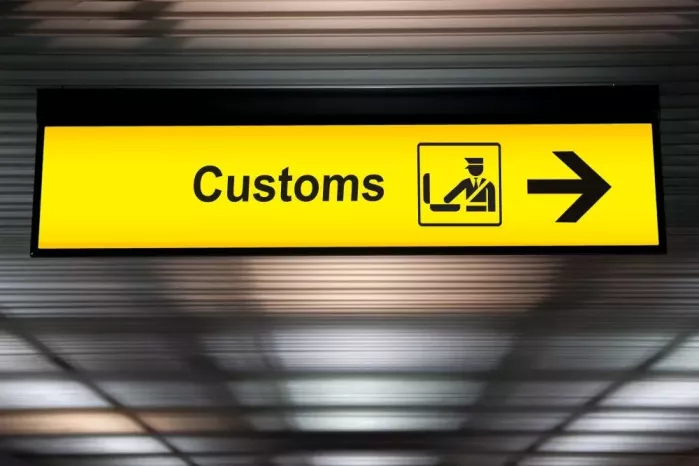What you can and cannot import into Indonesia, importing personal belongings into the country, rules, restrictions, customs fees, and other useful information.

Importing personal cargo to Indonesia is an important aspect to understand before traveling, as the country has prohibitions and restrictions that, if violated, can lead to significant consequences for passengers crossing the border. Since ignorance of the law does not exempt from responsibility, we recommend thoroughly familiarizing yourself with this topic.
IMPORT INTO INDONESIA
Prohibited by legislation
1. Drugs are strictly prohibited!
- Any narcotics: hard drugs, marijuana, psychotropic substances, opiates, as well as substances containing cannabis, and liquids like hemp oils, seeds, various drops, "fun" brownies, and chocolates, all of which, in some countries, might be souvenir items.
- Take this point extremely seriously; arriving passengers from Goa, Thailand, Amsterdam, etc., will be searched, found, and arrested for any dosage, even the smallest. Importing drugs into Indonesia is punishable by the death penalty or lengthy imprisonment if it can be proven in court that the drugs were for personal use and not for sale.
- Indonesia is one of the routes for international drug trafficking, so to avoid becoming a victim of drug networks, all passengers are strongly advised not to accept items from strangers, personally pack their luggage to know its contents, and carefully check items received from acquaintances, including the packaging used. Remember, passengers are fully responsible for the items they carry!
2. Pornographic films, images, or items containing elements of pornography.
3. Chinese literature: books, periodicals, press, manuscripts.
4. Chinese films, CD disks, audio cassettes, video recordings.
5. Chinese medicines and medical preparations, including traditional ones.
6. Communist literature, symbols, and attributes (Chinese, Soviet, etc.).
- Warning: a T-shirt with a sickle and hammer at the airport can be a reason for detention; this includes the Soviet (Chinese) flag. If you hang such things on your house, you could end up in jail.
7. Goods intended for sale.
- For wholesale items and those clearly not for personal use (new in packaging), customs will take notice, and the passenger will be required to pay customs duties and fines ranging from 100% to 500%, or they will be confiscated.
8. Items in cardboard boxes (items in them will be assessed as goods for sale).
9. Cosmetics, except those for personal use.
- If you have a batch of cosmetic products or any trade samples, you can obtain an Import Approval Certificate (SKI) from the Ministry of Trade and permission from BPOM (the National Agency for Drug and Food Control).
10. Traditional medicines, dietary supplements, vitamins, except those necessary for the treatment of the passenger's illness, require a medical certificate in English.
11. Specific medical preparations and medicines also require prescriptions and doctor's instructions in English.
12. Processed food products, as well as certain types of food items, are restricted:
- Fresh fruits
- Poultry meat
- Some types of sugar: raw cane sugar or raw sugar, refined, and white crystalline sugar
- Some types of rice
13. Radiophones, not cellular but wireless ones used at home (to protect the state from homemade radio sets).
14. Firearms, their imitation, including toys in the form of firearms (unless the passenger belongs to a security company, in which case a special permit from the Indonesian police is required). All other types of weapons: pneumatic, hunting, sporting, also require licenses and special permits from the police.
15. Ammunition (except for law enforcement agencies with special permission from Indonesian authorities).
16. Materials depleting the ozone layer
17. Other: Plastic bags in large quantities, besides packaging; antique products; items of folk crafts, and other items of various specificities are also considered prohibited goods.
Allowed but restricted for import.
1.Tobacco and Alcohol
In personal luggage, you can bring: 200 cigarettes, 25 cigars, or 100 grams of tobacco or other tobacco products, as well as 1 liter of spirits. Anything exceeding these quantities will be confiscated during inspection if found.
2. Electronics
The import of electronics, such as mobile phones, laptops, tablets, and drones, is allowed up to two pieces per person, as stated in the Ministry of Trade regulations. Anything beyond this needs to be declared in the electronic customs declaration (E-CD), which all passengers arriving in the country must fill out. While personal items are rarely declared, they may raise suspicions if they appear intended for sale.
3. Clothing
The import of new clothing items is allowed up to 10 pieces, as stipulated by the Ministry of Trade. Note: There are restrictions on the import of new clothing in customs legislation, and used clothing is entirely prohibited. However, in practice, customs officials at the airport do not confiscate passengers' personal items. These legal wordings are used to restrict the activities of illegal traders and online stores, which customs officials are keen on identifying. This is because Indonesia is a major textile producer, with numerous clothing manufacturing businesses on Java, supported by the government to encourage the population to buy locally produced goods. There have been no precedents of tourists having their clothes confiscated upon entering the country, but just to be safe, remove any extra tags from your shopping items.
4. Large Sums of Cash
The set limit for the import and export of cash is 100,000,000 Indonesian Rupiah (IDR) or more, or an equivalent amount in another foreign currency. If you have this amount or exceed it, you must fill out a customs declaration and go through the red corridor. If you plan to bring in more than 100 million Rupiah in cash, you must obtain permission in advance from the Bank of Indonesia (BI: Bank Indonesia), and all banknotes will undergo authenticity checks.
5. Luxury Items (Bags, Jewelry)
Items classified as luxury goods (bags, jewelry) may be identified by customs officials as items intended for sale. Therefore, passengers should have these items in limited quantities strictly for personal use.
6. Limits on Paying Import Duties on Personal Items
If the value of a passenger's personal items exceeds $500 USD, duties and taxes are imposed (import duty rate is 10%, and Value-Added Tax (VAT) of 11% may be added, along with income tax according to legislation on the specific product). To prove the price, it is necessary to keep receipts for new items.
Limited Import
This means that items can be brought into the country, but various conditions apply. For example, items like a video camera, binoculars, a radio cassette player, or sports equipment can be imported with the condition that the tourist takes them out upon departure. Customs officers may suggest leaving a sum of money as a deposit until departure, and the calculation will depend on the item.
In the aircraft cabin, you can take as part of hand luggage:
- 50 ml of perfume or 250 ml of toilet water
- 500 g of coffee or 100 g of tea
Quantities exceeding these norms are subject to import duties.
Animals
One of the common concerns for expatriates and those planning long-term stays is the importation of pets. Despite the perception that it is difficult, expensive, and poses risks to the animals, there are logistics companies and specialized agencies that handle the import and export of animals from the country. For cats or dogs (other types of animals should have their import possibilities clarified), the following conditions must be met:
- Age of at least 4 months.
- Rabies vaccination (administered no later than 30 days before departure and no earlier than 12 months before the trip).
- Health certificate issued by an authorized state veterinarian (a fully filled passport with all vaccinations).
- Health certificate from a veterinarian.
- Additional blood test for rabies antibodies.
- Import permit issued by the Directorate General of Livestock Services of Indonesia shortly before departure.
Upon arrival in the country, all animals must undergo a 14-day quarantine in Jakarta, although some carriers offer shorter quarantine periods. Afterward, you can either pick up your pet, or it will be delivered to you. Carriers handle their special passengers carefully, sending owners photos every few hours. However, there is a risk associated with stress during a long flight and separation from owners, so to minimize this risk, flying through Jakarta and checking the carrier's conditions in advance is advisable. There are numerous cases of owners successfully importing and exporting their pets.
Two days before the arrival of the animal, contact the animal quarantine department at Jakarta's Soekarno-Hatta International Airport.
For additional information, inquiries can be directed to the Directorate General of Livestock Services and the Animal Health Department.
Food Products
A permit from the Agricultural Quarantine Agency (Badan Karantina Pertanian) is required for animal, plant, and fish products.
Food products, beverages, medicines, and others must obtain approval from the National Agency of Drug and Food Control (BPOM).

Packages
Sending packages to Indonesia comes with its own nuances. All shipments go through customs in Jakarta, where they are inspected, and most are unpacked. All the restrictions mentioned earlier apply, but special attention is given to used personal items, especially clothing. Expatriates living in the country for an extended period often send their own belongings, and according to the law, second-hand items are either prohibited from import or subject to additional taxes. Such a package might be detained at customs, unpacked, and potentially damaged, or, if it reaches the post office, you might be asked to pay a tax several times higher than the value of the items. The maximum weight for a package is 30 kg, and the final calculation, including customs duty, VAT, and income tax, depends on the declared value and a separate calculation known only to these services. Shipments with a value below three US dollars are exempt from import duty.
Here are a few hacks to minimize transportation costs and ease the fate of your belongings:
1. If the recipient's name is an Indonesian, the tax amount will be much lower. Make arrangements with acquaintances for assistance.
2. Pack your clothes and other items in separate bags, seal them, include tags and receipts. If an item is branded, customs officials may check its actual price on the website.
3. In the postal description, there's no need to specify the exact quantity, and you can put any price according to logic, preferably the minimum. If customs calculate violations for the package, one assessment option is 25,000 IDR per item.
If a package is a direct purchase from a foreign store and contains more than 10 pieces of clothing, it will definitely be detained at customs. You will be asked to visit the local customs office for the calculation of import duty.
Reference Information:
Legal basis
- Minister of Finance Decree 188/PMK.04/2010 "On the import of goods transported by passengers, vehicle crews, persons crossing borders, and cargo."
- Government Regulation No. 29 of 2021 (GR 29/2021)
- List of prohibited imported goods is available in Trade Ministry Regulation 18/2021. Link to the document
- Official website of the Indonesian Tax Service.
For more detailed information on imported items in Indonesia, you can contact the Indonesian Embassy or Consulate, ask acquaintances in Indonesia to inquire with customs, or contact the national drug and food control agency, the drug enforcement department (BNN), and other relevant authorities for consultations.
EXPORT FROM INDONESIA
The list is lengthy, and the official document in Indonesian can be found here.
Prohibited items for export include animals and plants (for the export of pets, follow the rule described above), animal by-products, and goods made from them. Export of python skins is prohibited.
For the export of marine hydrobionts, veterinary certificates from the seller are required, and confirmation of a registered quarantine base in the importing country is needed.
Fresh fruits (except durian) can be exported.
Carvings made of wood and certain cultural items are officially prohibited from export. Therefore, details must be clarified for each item separately, and it may be necessary to obtain export documents.
For assistance, you can contact cargo companies. To send cargo from Indonesia, it is recommended to use the services of the "Cargo Indonesia Group" company.
Telegram: @Cargoindonesiagroup.

You can add one right now!